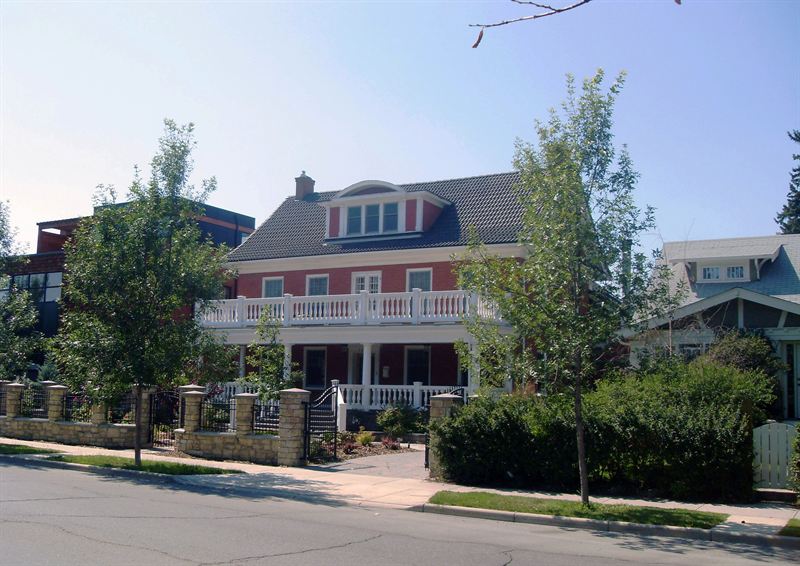This private home, built in the Georgian Revival style, can be seen from Elbow Dr. S.W. and makes a stately addition to the Elbow Park community.
The Elbow Park district lay outside the city limits until 1907, when it was annexed and subdivided into development lots. Serious residential development began in 1911, near the height of Calgary’s pre-World War I real estate boom, and lasted until 1915. Joseph William Campbell acquired this lot around 1911, and a building permit was recorded on March 29, 1912, for a frame residence to be built by day labour at an estimated cost of $2,600. The builder was evidently Louis J. Kompf. J.W. Campbell was a contract manager for the Canadian General Electric Company in Toronto before moving to Calgary during the pre-World War I boom as manager of the Alberta Portland Cement Company. In 1910, Campbell joined with R.J. Hutchings, president of the Great West Saddlery Company, to form General Supplies Limited. Campbell became vice-president and general manager of the new firm, which sold electrical and pumping machinery, water and sewer supplies, and other building materials.

Campbell, who in 1913 served as president of the Calgary Board of Trade, lived in this house circa 1912-1918. His date of death is unknown. The house remained family property until it was sold around 1929, after the death of his wife, Mary Ada Campbell. Following the Campbells’ occupancy, residents included lawyer Percy Carson (1919), Mrs. Adelaide E. Parker (1920-1921), and Mrs. W.A. Stevens (1922). From around 1924 to 1927, this was the home of John Burns, general manager (and later president) of P. Burns & Co. Ltd., and nephew of Senator Patrick Burns. The next long-term owner/occupant of the house, from 1929 to 1957, was industrialist Frederick L. Irving and his family. Born in Moncton, New Brunswick around 1881, Irving moved to Calgary in 1910. Within a couple of years, Irving and a business partner founded Riverside Iron Works, a significant Calgary firm which by 1929 had 275 employees. In 1929, Irving sold his interest in Riverside Iron Works to the Dominion Bridge Company, and remained as that firm’s local manager for several more years. Irving later founded the Black Nugget Coal Company, helped establish Irving Wire Products, and became director of Foothills Steel Foundry. A football enthusiast, Irving was president of the Calgary Bronks Football Club in 1938-1939, and had floodlights installed at Mewata Stadium. He was a member of the Salvation Army advisory board and the Board of Managers of Knox United Church, and was a director of the Glencoe Club. Irving was a founding member of the Alberta Motor Association and belonged to the Downtown Rotary Club. He retired in 1955 and died in 1972. Chartered accountant Brian Abbott, chief administrator of Devon Palmer Oils, bought the house in 1957, and lived here until his death around 1959. His widow continued to live in the house until 1972.
Article and photo provided courtesy of Discover Historic Calgary resources via calgary.ca.









